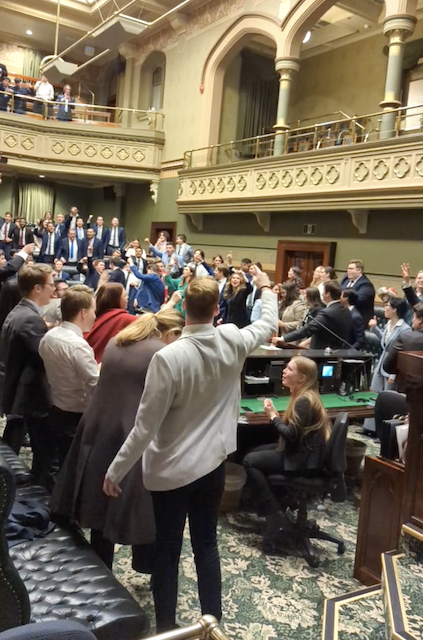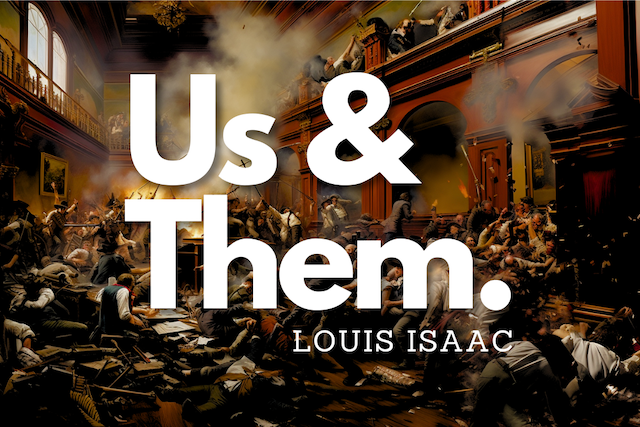I’ve never been comfortable around symbols of power. Growing up as I did you learn to be wary of police and men in suits, and they learn to be wary of you too.
I remember feeling that sense of unease as I stepped off the train at Martin Place and crossed the road at the top of the hill. I knew where the security gate was; I’d passed it many times, but this time I was going in.
I took a breath. “Is this NSW Parliament House?”, I chirped, trying to sound confident. Aware of the uncertainty in my voice, a police officer’s eyes flashed with scepticism as he lifted himself from his chair to engulf me in his shadow.
“I believe there is a debate here tonight? Like, between Young Labor and Young Liberals? I got invited… I mean, I think my name should be on the list somewhere?”.
I felt as out of place as I looked – denim jacket, long dreadlocks – but after searching my soul for ill-intent, and finding none, he waved me through. I picked up my keys and phone on the other side of the metal detector and there I was, turned loose for the night in the state’s hall of power.
About a month before I’d enrolled into university to study political economy. After nearly 20 years in the music business I’d grown tired of the ego and the hustle, of the constant self-promotion. We live in a world with real problems and I felt I needed to be a part of something bigger and more meaningful, so I went searching. Less than two weeks into my first semester I got a message: “Hey Louis! The annual Young Labor vs Young Liberals Debate is on tonight! The topic is “Which party is best placed to lead the country?”, you’re most welcome to come by (and laugh at the Young Liberals with us).”
How could I possibly refuse?
I’d heard stories about the Young Liberals for a long time but never met one in the wild. They’re the mythical beast of the university political scene; you never actually see them but they’re never far away, occasionally popping up in headlines for the odd Nazi salute or for trying to do political campaigning on Tinder. Sometimes for resorting to fisty-cuffs at an official party gathering, or even occasionally getting in trouble for calling Germaine Greer a “cum guzzling slut” who “doesn’t believe in God”.
It was in front of a well-dressed crowd of Young Liberals at a $100 per head fundraiser that Alan Jones famously pronounced Julia Gillard’s father dead from “shame”, and cautioned the next generation of party faithful not to be weak and simply “back off [because] she’s a woman”.
I tried hard to square those stories against the portraits of old courtly men in legal gowns that lined the mahogany walls of the foyer as I stood waiting for people to arrive: each of them holding important looking pieces of paper, gazing silently into some profound unknown. The elected representatives of a great democracy.
The humble entry to the People’s Parliament had opened out to an expansive hall built around a large fountain, lined with white marble and lush red carpet. It was after hours and nothing moved, even the receptionist had gone home. I wanted to recline on one of the old-country Chesterfield sofas, but didn’t want to alert security, so I stood respectfully and waited.
Slowly people arrived. A few familiar faces began to filter in and the awkwardness and trepidation gave way to excitement. Eventually someone emerged to take us past the oversized portraits of King George and Queen Elizabeth, past the indoor tropical garden and up the lift to the Labor Party caucus room.
The orange light of sunset over Sydney burst through the narrow glass window while a hundred Young Labor rank and file piled in. Wide-eyed and wired, still thumping with teenage growth hormone, they snapped mid-sentence from one conversation to the next, carried by the electricity of this once-in-a-lifetime moment. Some brandished bits of paper with pencilled speeches from which they delivered lines with Shakespearean fervour to audiences of friends that swooned and squealed with delight – “Yeh man, the Libs have got no comeback for that one!”. The Gods of NSW Labor looked on approvingly from their still photos that hung on the walls of the party room.
I looked around, feeling way too old. Everyone knew everyone. At 20 years of age they were already lifetime members of The Party, readying themselves for careers in public life. Being in this place, at this moment, carried with it the pull of destiny.
The room hushed as a Labor member of parliament rose to address the rabble.
“I remember sitting in this very room almost 20 years ago, readying my speech,” he bellowed to a captive audience of starstruck youth. “There was another speech from a Young Liberal that night, the President of the Young Liberals in fact, his name was Dominic Perrottet!”
The name was met with jeers. The Labor man raised his hands to quiet the crowd.
“Which of you that sit here today will be Premier? Who will be Treasurer, or Minister for Health? Here with us tonight, in this room, is the next generation of leadership that will take this great state forward.”
The room became oddly still. High above the twinkling lights of Sydney below, a room of soon-to-be kings and queens looked around and began writing themselves, uninvited and unelected, into the pages of history. It occured to me that it was highly possible that the same thing was happening at the very moment in the Liberal party room too.
With the battle lines clearly drawn and the cavaliers masked in decorated armour, we went down to meet our opponents.
The two sides took their seats in the NSW Legislative Assembly Chamber. One hundred on each side, facing each other. Dangerously close.

I can’t remember who fired the opening shot but once the lead left the barrel, the whole room erupted in flames. Beads of saliva flew like artillery in all directions as, for the next two and a half hours, infantry from each side lined up to hurl themselves desperately onto the waiting swords of the opposition. The room continued its descent into bloody anarchy, diatribe after furious diatribe, until the next generation of political leadership lay slain in their entirety on the chamber floor.
What the f–k did I just watch? I felt dizzy as everyone rose to their feet and floated out into the foyer, shaking hands in congratulations as they went. The debate had ended abruptly without a “winner”, and everyone wanted to know “who won?”
I certainly knew who’d lost… everybody. I was done; I needed a strong drink. We left through the security gates as one large group reborn, and headed down through moonlit streets towards a bar closer to Circular Quay. It was hard to tell us apart as we stood in the faint glow of that courtyard, making one last toast to manifest destiny.
I wonder how much of us is actually discovered in the eyes of others: “those who sit opposite” as the parliamentary vernacular goes. Maybe that is why we find ourselves so desperate to subdue and destroy the wildness in other people; we are just trying to make something of ourselves.
Party politics is a dance we do with each other, an ancient ritual for the cultural landscape of suits and single-malt whisky. The point is not to change anything, but for the glory of the dance itself. And you can’t win, because winning would mean there is no one left to dance with.
The war between us and them, I realised, was less about the partisan lines that separate two political parties than it was about who ends up inside the circle of power, and who is left outside. I nursed my drink and looked towards the city.


